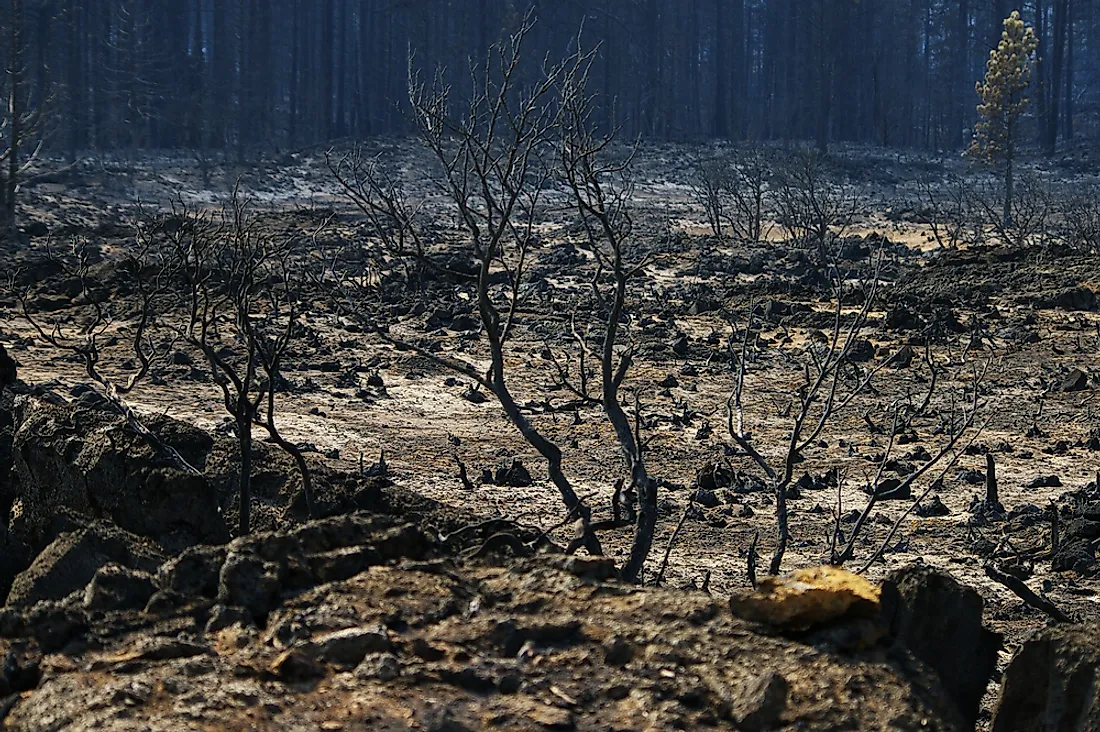What Are The Effects Of A Wildfire?

A wildfire is a fire that breaks out in an area having combustible vegetation. Wildfires can be caused by both man-made and natural factors. These fires are classified as bushfires, forest fires, desert fires, peat fires, etc., depending on the location and the type of vegetation involved. Wildfires can be highly destructive in nature and spread quickly engulfing massive areas within a short period of time. Here is a list of some of the damaging effects of a wildfire:
A Heavy Loss To The Economy Is Incurred
A wildfire devastates everything that it engulfs. Thus, large areas of productive agricultural or forest land might be lost in the fire. Farmers lose their crops and livestock within a matter of a few hours to a few days and suffer a great economic setback. Those dependent on forestry for their income also experience heavy losses. If the destroyed areas were part of a popular tourist destination, then the tourist industry active in the affected area also faces a downfall. Although these economic sectors are directly affected by the fire, other businesses and communities also experience the adverse effect of wildfires. Private properties are also lost in such fires. Direct costs associated with firefighting is also high and is usually borne by the government. Post-fire restoration activities also consume a large sum of money.
Local Heritage Could Be Lost
If the fire engulfs an area that protects ancient historic environment features or archeological remains, it can translate to the loss of such local heritage. The damage can occur not only during the fire but also as an after-effect of the fire. The lack of vegetation might expose such features to the erosive action of wind and water, accelerating the destruction of the features.
Carbon Sequestration And Storage Is Affected
Forests act as the carbon sink by absorbing the atmospheric carbon-dioxide and thus reducing the concentrations of this toxic gas in the atmosphere. The occurrence of wildfires thus destroys the beneficial plant cover which in turn adversely affects the carbon sequestration and storage.
Loss Of Biodiversity
Wildfires lead to the failure of the entire ecosystem. Large areas are cleared off vegetation. Many animals, birds, reptiles, and insects burn to death. Others die due to starvation or stress. Thus, a heavy loss of biodiversity is one of the worst consequences of a wildfire.
High Levels Of Soil Erosion
The soil is left exposed as vegetation disappears due to wildfires. Such soil is highly susceptible to erosion by the action of wind or water. Often, areas experiencing wildfires take a long time to recover or they are rendered permanently barren.
High Levels Of Air And Water Pollution
Smoke and ash released during fires can pollute the atmosphere with toxic gasses and particles. As an after-effect of a wildfire, the loss of plants can also lead to the erosion of the soil and the contamination of water bodies by the eroded soil and dead plant and animal matter.
Wildfires Can Lead To The Extinction Of A Species
Species with a highly restricted range are the most highly susceptible to extinction. A single disaster event can wipe out the entire population of such species. Thus, catastrophic wildfire events have the potential to render a species extinct in the wild. That is the reason why the IUCN Red List recognizes “fire and fire suppression” as one of the major threats to more than 100 threatened species in Australia. Recently, bushfires have destroyed 90% of the known habitat of the Western ground parrot, a bird whose population prior to the fires was estimated to be 140.
Wildfires Have Adverse Effects On Health
The smoke and ash generated from wildfires pollute the atmosphere and cause health issues in people breathing in the polluted gas. Breathing problems, respiratory infections, headaches, dizziness, eye irritation, etc., are some of the common health issues experienced by people living in areas near the fire.
Human Lives Are Lost During Wildfires
Often wildfires can kill people if they do not evacuate in time to avoid the fire since wildfires take very little time to spread. However, despite warnings to evacuate, some people hold on to their homes in the hope that the fire will not reach them. Many of these people lose their lives in the fire. For example, six people were killed in a wildfire as recently as July 2018 in northern California. The deadliest wildfires have accounted for over 1,000 lives lost.
Increased Vulnerability To Other Natural Disasters
Since vegetation cover is vital to protect the soil against erosion by strong winds and floods, the loss of such cover renders the area prone to natural disasters. In the absence of plants, the fire-affected region becomes easily prone to catastrophic floods or storms.











